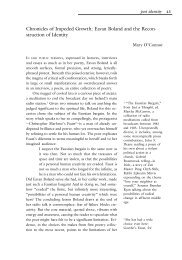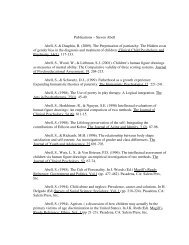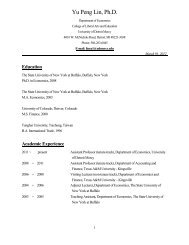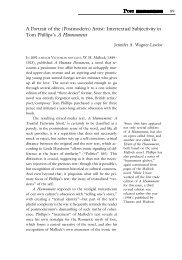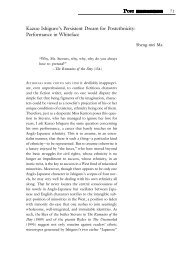Conquest, Conversion, and the Hybrid Self in Cabeza de Vaca's ...
Conquest, Conversion, and the Hybrid Self in Cabeza de Vaca's ...
Conquest, Conversion, and the Hybrid Self in Cabeza de Vaca's ...
You also want an ePaper? Increase the reach of your titles
YUMPU automatically turns print PDFs into web optimized ePapers that Google loves.
140 POST OST IDENTITY<br />
IDENTITY<br />
8 Todorov makes this<br />
general po<strong>in</strong>t about<br />
discovery narratives, most<br />
especially <strong>in</strong> connection<br />
with Columbus (34–46).<br />
natives, “for he himself un<strong>de</strong>rscored <strong>the</strong> fact that conversion<br />
did not take place,” <strong>the</strong> goal of negotiation is <strong>in</strong>extricably<br />
bound to his newly-fashioned concept of conversion<br />
(Adorno 1993, 74). Whe<strong>the</strong>r he succeeds or not <strong>in</strong> convert<strong>in</strong>g<br />
<strong>the</strong> natives is a moot po<strong>in</strong>t: he writes <strong>the</strong> narrative<br />
from <strong>the</strong> perspective of a missionary <strong>and</strong> he persuasively<br />
shows us that conversion is a methodology (a way of th<strong>in</strong>k<strong>in</strong>g<br />
about <strong>the</strong> New World), ra<strong>the</strong>r than a specific outcome<br />
(how many people did he actually convert). This new methodology,<br />
coupled with <strong>Cabeza</strong> <strong>de</strong> Vaca’s rhetorical skillfulness,<br />
controls <strong>the</strong> natives’ perceptions of <strong>the</strong> colonizer<br />
<strong>and</strong> yields a newly-empowered (although altered) coloniz<strong>in</strong>g<br />
self.<br />
By select<strong>in</strong>g to tell <strong>the</strong> Badth<strong>in</strong>g story, <strong>and</strong> juxtapose<br />
it after his own “miraculous performance,” <strong>Cabeza</strong> <strong>de</strong> Vaca<br />
also offers his Spanish rea<strong>de</strong>rs a <strong>de</strong>monstration of <strong>the</strong> effectiveness<br />
of <strong>the</strong> Christian voice <strong>in</strong> coloniz<strong>in</strong>g <strong>the</strong> New<br />
World. In many o<strong>the</strong>r discovery narratives, <strong>the</strong> conquistador<br />
believes himself to be a chosen prophet called by God<br />
to subject <strong>the</strong> newly-discovered cultures to Spanish rule<br />
through whatever means necessary, whe<strong>the</strong>r it be enslavement<br />
or mur<strong>de</strong>r. 8 In <strong>the</strong> words of Beatriz Bodmer, <strong>the</strong><br />
Spanish conquistador had a “religious justification rest<strong>in</strong>g<br />
both on a perceived obligation of <strong>the</strong> Christian monarchs<br />
<strong>and</strong> <strong>the</strong>ir vassals to extend <strong>the</strong> Christian empire” (18). But<br />
<strong>Cabeza</strong> <strong>de</strong> Vaca does not play that role: he wants to convert<br />
<strong>the</strong> natives, not enslave <strong>the</strong>m. As such, <strong>the</strong> colonizer<br />
seems to lose all his force—he has failed to conquer <strong>the</strong><br />
natives. But he does not if we re<strong>de</strong>f<strong>in</strong>e our un<strong>de</strong>rst<strong>and</strong><strong>in</strong>g<br />
of <strong>the</strong> colonizer (as <strong>Cabeza</strong> <strong>de</strong> Vaca does himself) as someone<br />
who must survive spiritual <strong>and</strong> physical trials <strong>in</strong> or<strong>de</strong>r<br />
to represent God <strong>and</strong> work out His div<strong>in</strong>e plan. <strong>Cabeza</strong> <strong>de</strong><br />
Vaca becomes a hero if we accept his story as a successful,<br />
although altered, version of conquest; he is a “hero” because<br />
he passes his spiritual <strong>and</strong> physical trials. He repackages<br />
his military <strong>and</strong> political failures as spiritual success by<br />
marshal<strong>in</strong>g evi<strong>de</strong>nce of a conquest that ga<strong>in</strong>ed control of<br />
no new territory <strong>and</strong> enslaved no Native Americans for <strong>the</strong><br />
Spanish crown.<br />
Not only <strong>the</strong>n is <strong>the</strong> colonizer an ambiguous figure to<br />
both us <strong>and</strong> himself, but so is his tale. Both self <strong>and</strong> dis-<br />
Alan J. Silva




